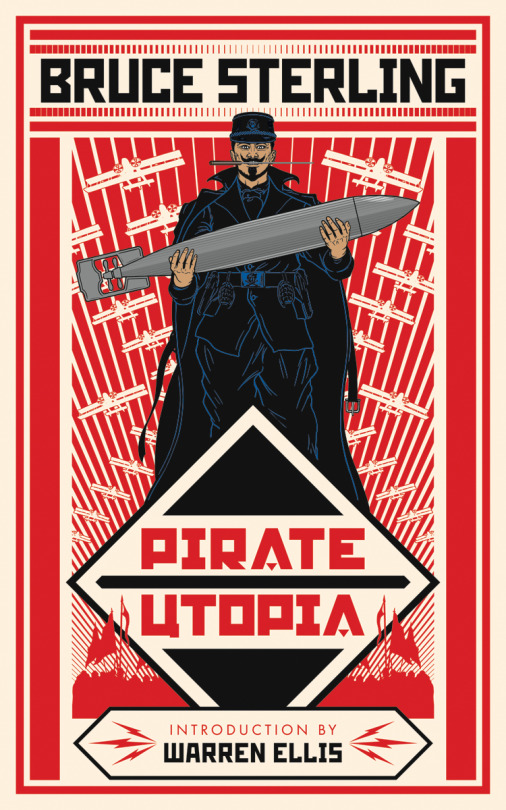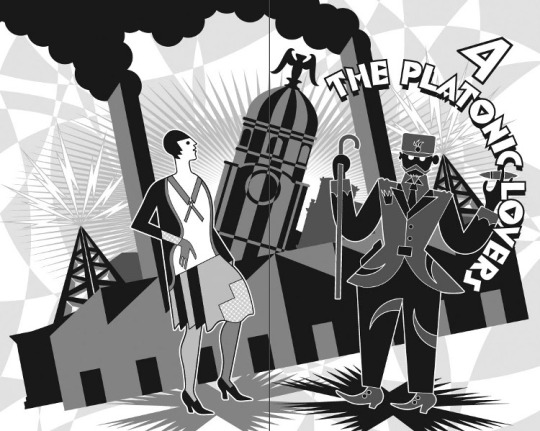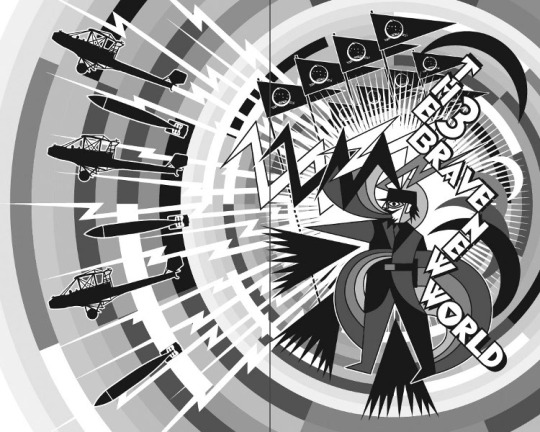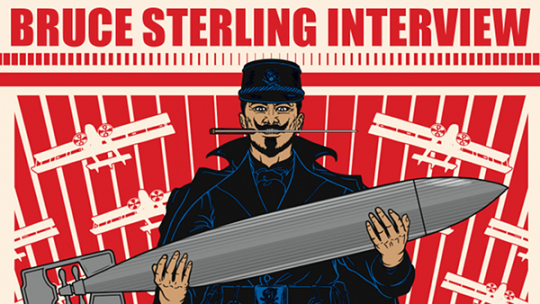PIRATE UTOPIA is unapologetically political and wildly entertaining

For THE GREEN MAN REVIEW, Richard Dansky praises Bruce Sterling’s PIRATE UTOPIA.
Sterling writes here with a nod to the comedic stylings of a Marx Brothers movie; the tone is always slightly madcap, even when the characters are discussing murder, revolution, and of course, flying torpedoes and death rays.
Which is fitting. The book’s set in the minuscule independent state of Carnaro just after the end of World War One. Led by a gaggle of inspirational Futurists with titles like The Prophet and the Ace of Hearts, it’s a radical experiment in independence and piracy, in the workers controlling the means of production and the rich getting it in the shorts. When we first arrive, the city of Fiume is full of revolutionary ferment, often against itself, and our hero is a half-deaf Italian engineer named Secondari, who’s sort-of-kind-of taken over a local torpedo factory belonging to the formidable yet sentimental Frau Piffer, a Corporate Syndicalist in training. And if you think that sentence was confusing, wait until you try to figure out how things actually work in Fiume.

Sterling has some fun with the historicity of it all, pausing here and there to take gleeful potshots – some literarily literal – at various historical characters. Mussolini, here a heroic newspaper editor, gets a couple of rounds in his lil’ Duce, courtesy of an ex-wife, while Hitler takes a bullet for a comrade before ever amounting to anything, and Woodrow Wilson gets poisoned by Communists. Then, Harry Houdini shows up with H.P. Lovecraft and Robert Howard in tow, and let’s just say things get weird.
The novella ends with shocking, but appropriate abruptness. At the last, Carnaro’s revolution has reached its ultimate phase; there’s nowhere else for it or Secondari to go. The reader is left with two simultaneous and opposing conclusions, one particularly depressing and pertinent in the age of Trump, and one quiet and hopeful and, dare I say it, human.
There are a few other bits in the book, of the nonfiction variety. The introduction is written with typical acerbic aplomb by Warren Ellis; in the back are an essay on the real-world historical underpinnings of the story by Christopher Brown, a lengthy interview with Sterling conducted by Rick Klaw, and a short essay on design by John Coulthart. All add depth to the main narrative, supporting the main event and sometimes putting it into rueful context. As for the book as a whole, it’s unapologetically political and wildly entertaining, a rare enough combination to make casual readers sit up and take notice.

Artur Coelho on the Portuguese site INTERGALACTIC ROBOT is fascinated with the book.
Interestingly, this PIRATE UTOPIA occupies the same conceptual space DIFFERENCE ENGINE, the novel four hands (with William Gibson) who became the cornerstone of steampunk . Pirate Utopia inspired by a time and specific place in European history, leading the reader to a delirious and blending historical figures and the vertigo of futurism. Not the speculation informed about futures, but the artistic movement of conceptual break with the past and fascination with the mechanical acceleration that was born in Italy in the early years of the twentieth century.

Sterlig crosses in this intriguing novel elements of its aspects of cultural intervention. Intellectual property, social progressivism, and technolocalculture intersect with echoes of vibrant cultural movements of the past, absurd points in recent history, and the feeling that interesting things are passing on the fringes of the quiet continuum of historical becoming. It’s not Sterling in his classic best, he’s a master looking for a new voice, and showing that he clearly enjoys the process. Complementing the book are illustrations by John Coulthart inspired by the futuristic and constructivist aesthetics, which replicate a bit of fascination with the mechanical vertigo asserted by Marinetti in his classic manifesto. And if doubts persist rises Sterling has become native, there is collected in the book a fantastic interview where cyberpunk veteran discusses the turbulent history of the twentieth century in southern Europe and the importance of fantascienza as gender merger between FC, speculative fiction, fantasy and Fantastic.
(Translation from the Portuguese courtesy of Google)

On January 14, Sterling joins the GEEK’S
GUIDE TO THE GALAXY podcast to discuss PIRATE UTOPIA.
For more info on PIRATE UTOPIA, visit the Tachyon page.
Cover and illustrations by John Coulthart
